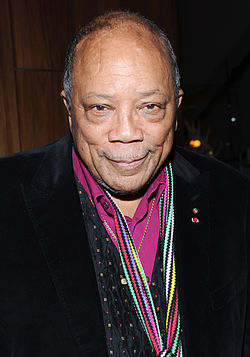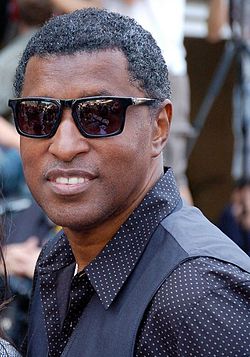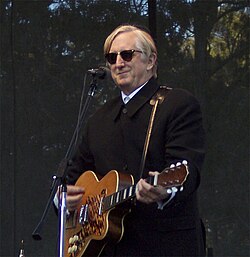American music award category
The Grammy Award for Producer of the Year, Non-Classical is an honor presented to record producers for quality non-classical music at the Grammy Awards , a ceremony that was established in 1958 and originally called the Gramophone Awards.[ 1] National Academy of Recording Arts and Sciences of the United States to "honor artistic achievement, technical proficiency and overall excellence in the recording industry, without regard to album sales or chart position".[ 2]
The award was first presented at the Grammy Awards in 1975. According to the category description guide for the 52nd Grammy Awards , the award is presented to producers who "represent consistently outstanding creativity in the area of record production".[ 3] [ 4]
Producers with multiple wins [ edit ]
Producers with multiple nominations [ edit ] 11 nominations 8 nominations 7 nominations 6 nominations 5 nominations 4 nominations 3 nominations 2 nominations
^ "Grammy Awards at a Glance" . Los Angeles Times . Retrieved April 29, 2010 .^ "Overview" . National Academy of Recording Arts and Sciences . Archived from the original on January 3, 2011. Retrieved April 29, 2010 .^ "52nd OEP Category Description Guide" (PDF) . National Academy of Recording Arts and Sciences. p. 7. Archived from the original (PDF) on October 27, 2009. Retrieved April 28, 2011 .^ Paul Grein (June 13, 2023). "Here's Everything We Know About the 3 New Grammy Categories for 2024" . Billboard . Retrieved June 14, 2023 . ^ "Grammy Awards Nominee 1975 - Grammy Award Winners 1975" . www.awardsandshows.com . Retrieved May 2, 2017 .^ "Grammy Award Nominees 1976 - Grammy Award Winners 1976" . www.awardsandshows.com . Retrieved May 2, 2017 .^ "Grammy Award Nominees 1977 - Grammy Award Winners" . www.awardsandshows.com . Retrieved May 2, 2017 .^ "Grammy Award Nominees 1978 - Grammy Award Winners 1978" . www.awardsandshows.com . Retrieved May 2, 2017 .^ "Grammy Award Nominees 1979 - Grammy Award Winners 1979" . www.awardsandshows.com . Retrieved May 2, 2017 .^ "Grammy Award Nominees 1980 - Grammy Award Winners 1980" . www.awardsandshows.com . Retrieved May 2, 2017 .^ "Here's complete list of the Grammy nominees" . Eugene Register-Guard ^ "Grammy Award Nominees 1982 - Grammy Award Winners 1982" . www.awardsandshows.com . Retrieved May 2, 2017 .^ "Grammy Award Nominees 1983 - Grammy Award Winners 1983" . www.awardsandshows.com . Retrieved May 2, 2017 .^ "Complete List of the Nominees for 26th Annual Grammy Music Awards" . Schenectady Gazette ^ "27th Annual GRAMMY Awards" . GRAMMY.com . January 16, 2013. Retrieved July 26, 2017 .^ Graff, Gary (January 11, 1985). "The Grammy Awards: Prince, Tina Turner, Cyndi Lauper take five nominations each" . Detroit Free Press . pp. 1C, 5C. Retrieved July 26, 2017 – via Newspapers.com. ^ "Grammy Winners" . Los Angeles Times . February 27, 1985. p. 5V. Retrieved July 26, 2017 – via Newspapers.com.^ Hunt, Dennis (January 10, 1986). " . Los Angeles Times . p. 3. Retrieved July 3, 2011 . ^ Hunt, Dennis (January 9, 1987). "Grammy Nominations: Highs and Lows" . Los Angeles Times . p. 2. Retrieved May 13, 2011 . ^ "Nominees for Grammys". St. Louis Post-Dispatch . January 15, 1988. p. 4B. ^ "Grammy nominees". St. Petersburg Times . January 13, 1989. p. 3.D. ^ "Annual Grammy Nominations" . UPI . United Press International, Inc. January 11, 1990. Retrieved August 14, 2020 .^ Shane, Larry (January 11, 1991). "Collins, Jones and Carey top Grammy nominations". The Kansas City Star ^ Considine, J.D. (February 23, 1992). "Handicappers' Guide to the Grammys Don't place any bets on the obvious picks". The Baltimore Sun . p. 1.H.^ "Grammy nominees". The Baltimore Sun . January 8, 1993. p. 2.D. ^ "General Categories". Los Angeles Times . January 7, 1994. p. 18. ^ "The 37th Grammy Nominations" . Los Angeles Times . January 6, 1995. p. 11. Retrieved May 2, 2011 .^ "The 38th Annual Grammy Nominations: The Complete List of Nominees" . Los Angeles Times . January 5, 1996. p. 11. Retrieved May 2, 2011 .^ Kot, Greg (January 8, 1997). "Pumpkins A Smash With 7 Grammy Nominations" . Chicago Tribune . Retrieved May 1, 2011 . ^ "Complete list of Grammy nominations" . USA Today the original on February 10, 1999. Retrieved May 1, 2011 .^ "1999 Grammy Nominees" . NME the original on October 11, 2012.^ "A Complete List of the Nominees" . Los Angeles Times . January 5, 2000. Archived from the original on July 25, 2015.^ Boucher, Geoff (January 4, 2001). "Grammys Cast a Wider Net Than Usual" . Los Angeles Times . p. 5. Archived from the original on May 14, 2012. Retrieved April 29, 2011 . ^ "Complete list of Grammy nominations" . The Seattle Times . January 4, 2002. Archived from the original on December 4, 2011. Retrieved April 29, 2011 .^ "Grammy Nominations: Complete List" . Fox News Channel . January 3, 2003.^ "Complete list of Grammy nominations" . The Seattle Times . December 5, 2003. Archived from the original on January 6, 2017. Retrieved April 29, 2011 .^ "Fast Facts: List of Grammy Nominees" . Fox News Channel . February 13, 2005. Retrieved April 29, 2011 .^ "Complete list of Grammy Award nominations" . USA Today . December 8, 2006.^ "49th Annual Grammy Awards Winners List" . National Academy of Recording Arts and Sciences. Archived from the original on October 8, 2009.^ "The Complete List of Grammy Nominees" . The New York Times . Retrieved April 29, 2011 .^ "Grammy Scorecard" . Los Angeles Times . December 3, 2008. Retrieved February 12, 2011 .^ "Grammy Awards: List of Winners" . The New York Times . January 31, 2010. Retrieved April 29, 2011 .^ "53rd Annual Grammy Awards nominees list" . Los Angeles Times . Archived from the original on February 5, 2011.^ "A complete list of winners and nominees" . Los Angeles Times . 2012.^ List of 2013 nominees Archived February 1, 2012, at the Wayback Machine ^ "Google" . www.google.com . Retrieved 2017-04-06 .^ List of Nominees 2015 ^ "Grammy Nominations 2016: See the Full List of Nominees" . Billboard . December 7, 2015. Retrieved December 7, 2015 .^ "Grammy Awards 2017: See the Full Winners List" . Billboard . Retrieved 2017-04-06 .^ Grammy.com, 28 November 2017 ^ Grammy.com, 7 December 2018 ^ Grammy.com, 20 November 2019 ^ Grammy.com, 24 November 2020 ^ Horton, Adrian (2022-04-03). "Grammy awards 2022: list of winners" . The Guardian . Retrieved 2022-04-07 . ^ "2023 GRAMMY Nominations: See The Complete Nominees List" . www.grammy.com . Retrieved 2022-11-17 .^ "2024 GRAMMY Nominations: See The Full Nominees List | GRAMMY.com" . www.grammy.com . Retrieved 2023-11-12 .^ Monroe, Jazz (2024-11-08). "Grammy Nominations 2025: See the Full List Here" . Pitchfork . Retrieved 2024-11-09 .
1970s 1980s 1990s 2000s 2010s 2020s
Special awards Ceremonies
(years are of music release; ceremonies are the next year) Related By country
General Children's, Comedy, Classical Country & American Roots Gospel & Contemporary Christian Jazz, Traditional Pop, Latin, Global, African, Reggae Package, Notes & Historical Pop & Dance/Electronic Production, Engineering, R&B, Rap and Spoken Word Poetry Rock, Metal & Alternative Special Awards













